To contribute to implementing the national action month for food safety in 2023 with the theme "Ensuring food security and safety in a new situation", the research team "Preservation and processing of products of animal origin” organize a seminar on April 15th, 2023, with the presence of experts:
Mr. Rolf Schoenert, Senior Legal and Policy Advisor, SAFEGRO Project. Former Deputy Director, Canadian Food Inspection Agency.
Mr. Pham Van Hung, Assoc. Prof, Senior Lecturer at Faculty of Economics and Rural Development. VNUA's research team leader in the SAFE PORK project. Project members: International Livestock Research Institute (ILRI), Vietnam National of Agriculture (VNUA), Hanoi University of Public Health (HUPH), National Institute of Animal Science (NIAS), University of Sydney.
Research and product communication team of Yakult Vietnam company.
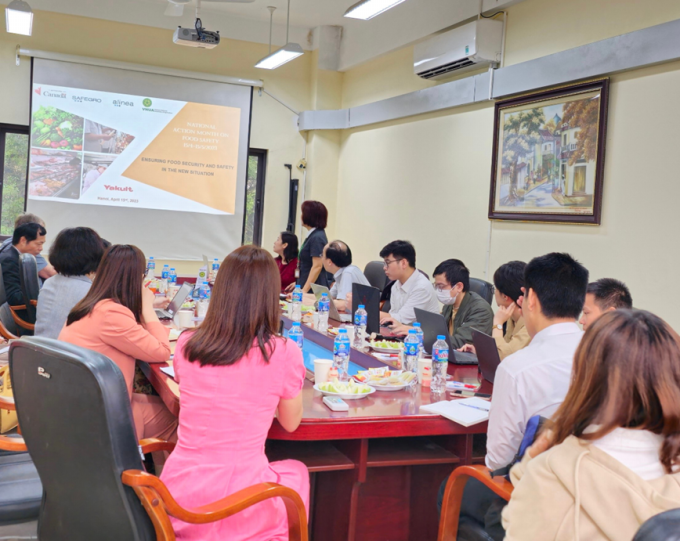
Inaugural speech to launch action month for food safety by the research team.
Firstly, Mr. Rolf Schoenert give a brief introduction about SAFEGRO (The Safe Food for Growth Project) project. This project is funded by the Canadian government in Vietnam, implemented in 5 years (2020-2025) with a budget of 15,3 million Canadian dollars. The project seeks to enhance the Vietnamese population’s access to safe and competitive agri-food products, with an aim to improve the well-being of female and male consumers as well as other agri-food sector actors. SAFEGRO is implemented by Alinea International in partnership with the University of Guelph, Canada.
The project focuses on three major components: (1) Improving performance for food safety outcomes of national and sub-national governments in order to achieve international standards with the desired results (i) Improving capacity of the Food Safety Management Agencies, (ii) Improving food safety control capacity of competent authorities to support the risk-based food safety management system, (iii) Strengthen capacity to apply a risk-based approach by FS Management Agencies; (2) Promoting competitiveness of poor farmers and other value chain participants, in order to supply safe agricultural products and food for domestic and international markets with expected results (i) Strengthen capacity of agri-food value chain actors, particularly women, to supply safe agri-food products, with gender equality and environmental sustainability, (ii) Enhancing capacity of agri-food value chains to ensure traceability and food safety, (iii) Improving agri-food value chain capacity to apply innovative solutions, climate smart and gender-sensitive agriculture approaches, technologies and practices; (3) Increasing competitiveness of poor farmers and other value chain participants, awareness by consumers, particularly women, of the critical importance of food safety and their rights to have access to and availability of affordable, safe agri-food products in selected provinces and centrally-run cities in Vietnam. The project focuses on the two cities with the highest population rates in the country, Ho Chi Minh City and Hanoi.
Mr. Rolf Schoenert also present the topic "Food Safety Management System - Canadian Experience". He introduced Canada's food safety management system through stages and responsibilities of functional units in creating a legal system on food safety, and some typical cases of food poisoning leading to a change in food safety policy. Canada's policy framework is continuously reviewed and improved according to the PDCA cycle to meet the requirements of stakeholders. Risk prevention and assessment are prioritized. These are valuable experiences to help develop Vietnam's food safety management system.
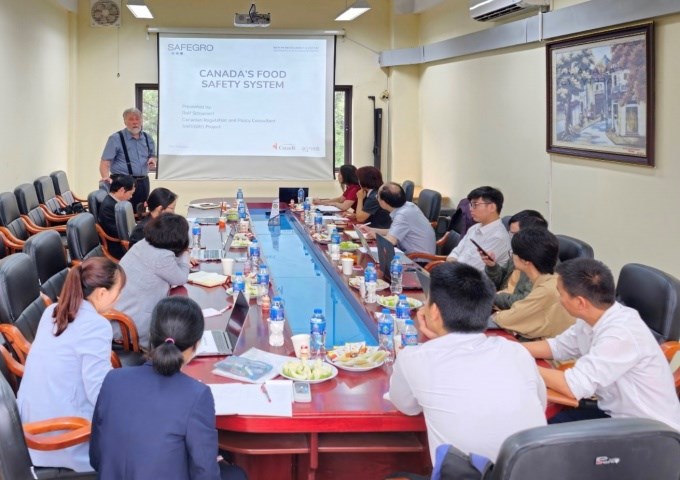
Mr. Rolf Schoenert introduces the SAFEGRO project and Canada's food safety management system
Besides, Mr. Pham Van Hung presente at the seminar with the topic: "Assessment of knowledge, attitudes and practices of actors in the pork value chain" which provide an overview of the research team's survey data. Vietnam is one of the countries with a developed pig industry, however, there are still some limitations in the knowledge, attitudes, and practices of actors in the pork value chain. Feed manufacturers: Although there has been an improvement in the quality of feed products, some products do not fully meet the nutritional needs of pigs. In addition, the lack of knowledge of nutrition and herd management leads to nutritional deficiencies and diseases in the herd. Farm owners: Some farm owners do not have enough knowledge of pig-raising techniques, pig herd management and pig health care leading to sickness, mortality and poor meat quality. Some farmers' attitudes and practices do not fully comply with regulations on food safety and environmental sanitation. Processing factories: Although Vietnam has many pork processing factories that meet international standards and are certified, some factories do not fully meet the standards of food safety and environmental hygiene. There is also a gap between consumers' knowledge, attitudes and practices about pork safety. Consumers are aware of food safety issues but slowly change their practices. For consumers, the government (including local authorities) plays an important role in addressing safety issues in the food value chain, so local governments should be involved in the intervention, especially in strengthening communication. Overall, there is a need to improve the knowledge, attitudes and practices of actors in the pork value chain in Vietnam, and investment in technology and infrastructure to improve product quality is required. and ensure food safety for consumers.
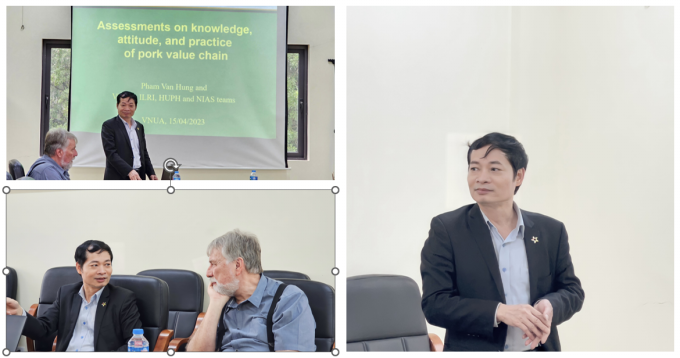
Mr. Pham Van Hung shares the results of the assessment of knowledge, attitudes, and practices of actors in the pork value chain of the SAFEPORK project
Finally, Ms. Tran Thi Na presente "Efficacy of synbiotic LBG-P from Yakult". Yakult's Synbiotic LBG-P is a new product (2 in 1), consisting of a combination of probiotics and prebiotics. Probiotics are healthy microorganisms that are added to the body to strengthen the gut microbiome, including Lacticaseibacillus paracasei Shirota and Bifidobacterium breve Yakult. Prebiotics are nutrients that cannot be digested by the human body but provide nutrition for beneficial microorganisms and help them grow and develop. In this product, the main prebiotic is galactooligosaccharides (GOS). Research results have shown that, when used, synbiotics have the effect of enhancing the intestinal microflora, helping to maintain the balance between beneficial microorganisms and harmful microorganisms, and supporting the intestinal microflora. digestion and strengthens the immune system. How to use the product is also clearly instructed.
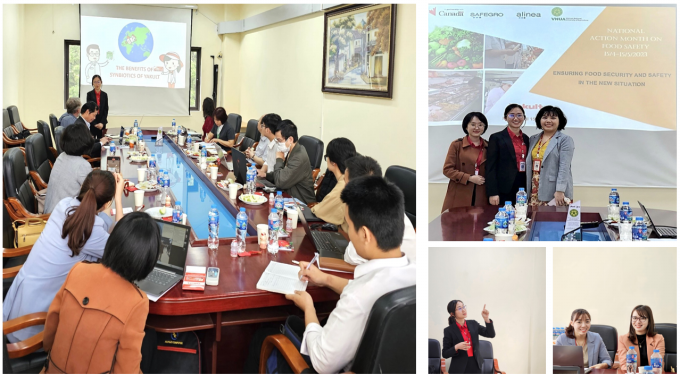
Ms. Tran Thi Na and her team introduce the new product Synbiotics LBG – P of Yakult.
The seminar participants were very interested and discussed enthusiastically each topic.
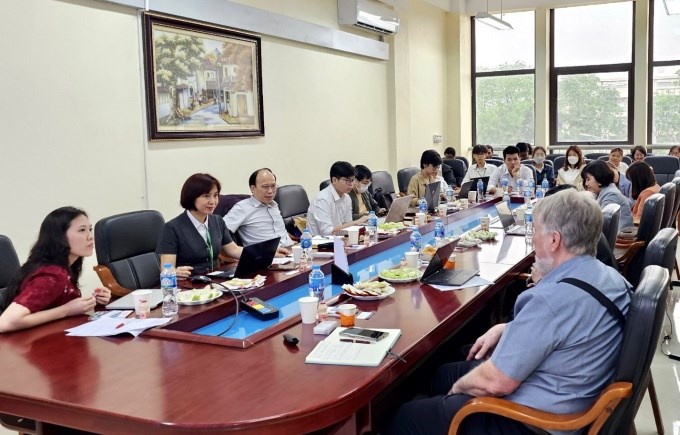
Lively discussion
The representative of the research group thank the speakers. The working session bring many research ideas to the participants. The research group continues to propose research topic on policies, technologies as well as methods to improve and enhance food safety in production chains.

All members attending the seminar take souvenir photos
Research Group Preservation and Processing of products of animal origin